Deendayal Research Institute
Illuminating the Path to Self Reliance
Deendayal Research Institute (DRI), established on March 8, 1968 under the inspirational guidance of Padma Vibhushan Shri Nanaji Deshmukh is currently working to validate the philosophy of “Integral Humanism”. Models for development such as providing services for health, hygiene, basic education, training for self employment etc. have been developed to achieve overall socio-economic development and reconstruction of Indian Society. The developmental programmes have been carried out at various centers viz. Delhi, Gonda, Balrampur (U.P.), Chitrakoot (U.P. & M.P.), Beed and Nagpur (Maharashtra).
The mission statement of Deendayal Research Institute is: “We are not for ourselves but for our kith and kin; our kith and kin are those who are oppressed and neglected”. The aim of the Institute is to evolve a social system for the transformation of our age old Indian Society suited to the modern scientific era, and based on the eternal values of Integral Humanism. With this aim, Deendayal Research Institute has undertaken following major programmes:
- To carry out research in Social Science with a view to reconstruct Indian Society.
- To establish Rural Development and Training centers for carrying out research with a view to motivate people in adopting new and improved technologies in the field of sustainable Agriculture, Water Conservation & Alternative Industrialization, as well as to promote self-employment.
- Activities in the field of medical research, medical care, life-long health and medical education.
- To set up Academic and Technical Vocational Training centers in rural areas.
- To eradicate social evils by propagating human values with the active cooperation and initiative of the people.
- To establish a Dispute free Society.
- Integrated Tribal Development.
- To ensure people’s initiative and active participation in the efforts.
- To Organize Intellectual Activities to further explore these goals.
- To share the experience and Intellectual property with other Organizations so that they may replicate or adapt these measures everywhere.
The basic tenets put forward by Shri Nanaji before the Organisation are “Gramodaya” and “Swavalamban”. His vision and down-to-earth practical approach reflect in every minute aspect of the organisation and the projects executed. Thousands of young people, inspired by his personality, and magnetized by his presence are actively participating in various programmes. The results achieved are unique, successful and amazing. All this was, and is, possible with the participation of the common man, the beneficiary of the projects.

Nanaji, with his great vision and complete faith in the latent strength of the people resolved to serve the tribal, the downtrodden and the neglected rural poor of the society, rejecting the lucrative offer of being Minister of Industries in the Cabinet of Shri Morarji Desai in the year 1977. Subsequently, his declaration made on 8th October 1978 in the presence of Loknayak Jayaprakash Narayan in Patna, is historical wherein he said, “After having lived through the experience of today’s political working style for 28 years, I have arrived at the conclusion that the prevalent present day politics can neither help the resurgence of constructive leadership nor become an instrument of social and economic reconstruction. To break this impasse, we shall have to find an alternative, constructive style of working in place of the present-day political methodology. Although I am aware of my shortcomings and limitations, I wish to dedicate the rest of my life in the pursuit of this goal. It is natural that I shall not only have to relieve myself of my present political responsibilities but also have to disassociate myself from party politics altogether. I pray to God that I be blessed and given the necessary wisdom and strength to succeed in this mission.”
Chitrakoot Project: Social Reconstruction
The Chitrakoot Project was a culmination of all the experiments conducted and the experiences gained through the earlier ventures Gonda and Beed as well as innumerable new innovations inspired by the earlier experiences to form a holistic rural development model. Chitrakoot is a small township bordering UP and MP, 120 miles south of Allahabad. The villages around it are predominantly tribal and backward in spite of the availability of rich resources like forest wealth and agricultural products. Lord Ram started the upliftment of the downtrodden from this historic place.
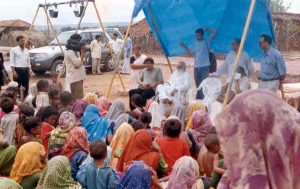 Nanaji has several firsts to his credit. The conception of Gramodaya Vishwavidhyalaya (Rural University) is one of them. It was established with the Objective of overall development of the students to make them self-reliant and confident so that they can generate their livelihood through their acquired skills; and more importantly to involve every member of the University – teaching, non teaching and the students in rural development programmes.
Nanaji has several firsts to his credit. The conception of Gramodaya Vishwavidhyalaya (Rural University) is one of them. It was established with the Objective of overall development of the students to make them self-reliant and confident so that they can generate their livelihood through their acquired skills; and more importantly to involve every member of the University – teaching, non teaching and the students in rural development programmes.
Mahatma Gandhi Chitrakoot Gramodaya Vishwavidhyalaya was established on 12th February 1991 and Shri Nanaji provided his leadership and guidance for three and half years as chancellor. This is the first rural University in India with twenty faculties providing facilities for higher education.
Self Reliance Campaign
DRI’s Chitrakoot Project is an integrated and holistic model for the development of rural India, based on the principles outlined in Pt. Deendayal Upadhyaya’s Integral Humanism to create a society based on the complimentarity of the family, school and the local population. The Chitrakoot Project is a self-reliance campaign that was launched on 26th January 2002 and covering 500 villages around Chitrakoot in 2 phases. On January 26th 2002, villagers from 80 of the 500 villages that form the 1st phase of the self-reliance campaign took the following oath:  “We all the villagers, with mutual cooperation, will make our village self-reliant. By January 26th 2005, we will eradicate unemployment, poverty, and illiteracy from our village. Every Family of our village will become self-reliant and prosperous. We will see to it that no dispute of our village will reach the court. And all the old disputes will be settled amicably at our village level. We will also see to it that our village will become green and clean and will build our village into a model of self-reliance”.
“We all the villagers, with mutual cooperation, will make our village self-reliant. By January 26th 2005, we will eradicate unemployment, poverty, and illiteracy from our village. Every Family of our village will become self-reliant and prosperous. We will see to it that no dispute of our village will reach the court. And all the old disputes will be settled amicably at our village level. We will also see to it that our village will become green and clean and will build our village into a model of self-reliance”.
The 80 villages taken up in the 1st phase became Self-reliant on 15th August 2005. The then President of India H.E. Dr. APJ Abdul Kalam visited Chitrakoot and got firsthand experience of the success of this campaign. He expressed his appreciated of this model of Deendayal Research Institute at various Forums. The remaining villages attained Self-reliance on 26th January 2011 and on 27th February 2011, the Self-reliance campaign was dedicated to the society in the august presence of Dr. APJ Abdul Kalam and other prominent personalities from social, political and spiritual fields.
The concept of Samaj Shilpi Dampati (SSD), a graduated young couple dedicated to the service in rural India, is unique and first of its kind in the present day world, came out of the vision of Shri Nanaji. Though this was conceived by him during the times of Gonda Gramodaya Project, it acquired its comprehensive form at Chitrakoot. The Chitrakoot project was chosen to bring out holistic development through people’s participation in about 500 villages in the radius of 50 km around Chitrakoot. The selected SSDs were trained to serve in a cluster of five villages to bring about this change in consonance with the main activities and the infrastructure established at Chitrakoot to meet the goals set in rural development. The field and purview of the SSD activity includes every aspect of the rural life, i.e. children’s education, health, women’s awareness, family planning, rural employment, agriculture, rural cooperatives, rural construction, etc. The approach of SSDs to any problem in these villages is beyond political affiliations. All their efforts are directed at making their fields of action, self-reliant and self-sufficient in every aspect of rural life. The use of the SSDs as a fulcrum through which all the Institute’s interventions in the villages were made was the key to the successful implementation of the Campaign.
The Self Reliance Campaign is in fact a holistic and integrated approach to Sustainable Village Development, tackling the inter-related constraints, needs and opportunities of poor villages. It rests firmly on the belief that to be effective over the longer term, assistance must empower the poor to participate in advancing their own development. It begins by listening to villagers and encouraging them to take the initiative.
The other major programs undertaken by the Institute are:
Water Management
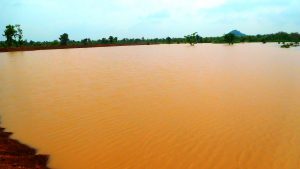 Water Management (including Watershed Management) is crucial to any developmental activity because it is the foundation of health and prosperity. The Program focuses on collection, conservation and storage of water ensuring sufficient supplies in close proximity to villages. Activities undertaken are building check dams, recharge wells, water literacy campaigns, soak pits, bio-sand filters, and water efficient agricultural technologies such as drip irrigation.
Water Management (including Watershed Management) is crucial to any developmental activity because it is the foundation of health and prosperity. The Program focuses on collection, conservation and storage of water ensuring sufficient supplies in close proximity to villages. Activities undertaken are building check dams, recharge wells, water literacy campaigns, soak pits, bio-sand filters, and water efficient agricultural technologies such as drip irrigation.
Livelihood – Income Generation
- Agriculture & Allied Sector
Agriculture is the mainstay in villages. Developments of agriculture in villages can bring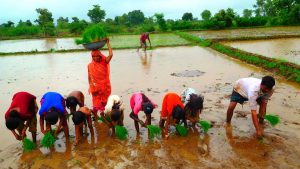 perceptible change in the life of farming communities. However, the condition of farmers is miserable, owing to very low productivity of crops and livestock. To enhance the productivity and make these villages self sufficient in food production, DRI’s Krishi Vigyan Kendras (KVK) are located at Satna in MP, Chitrakoot and Gonda in UP and Beed in Maharashtra are involved in promoting sustainable agriculture through introduction of improved farming technologies. In tune with the mandated activities, as set out by Indian Council of Agricultural Research (ICAR), all the four KVKs are engaged in technology assessment, and refinement and dissemination by conducting on farm testing (OFT); frontline demonstrations (FLD); training for farmers including farm women, rural youth and in-service personnel; production of seeds and planting materials and other extension activities. The transformation in the lifestyle of the rural farmers that has brought about by these centers has to be seen to be believed.
perceptible change in the life of farming communities. However, the condition of farmers is miserable, owing to very low productivity of crops and livestock. To enhance the productivity and make these villages self sufficient in food production, DRI’s Krishi Vigyan Kendras (KVK) are located at Satna in MP, Chitrakoot and Gonda in UP and Beed in Maharashtra are involved in promoting sustainable agriculture through introduction of improved farming technologies. In tune with the mandated activities, as set out by Indian Council of Agricultural Research (ICAR), all the four KVKs are engaged in technology assessment, and refinement and dissemination by conducting on farm testing (OFT); frontline demonstrations (FLD); training for farmers including farm women, rural youth and in-service personnel; production of seeds and planting materials and other extension activities. The transformation in the lifestyle of the rural farmers that has brought about by these centers has to be seen to be believed.
- Propagation & Conservation of Indigenous Livestock
Indian Agriculture, however well irrigated, is not complete without good cattle. DRI has introduced a program of up-gradation of cattle breeds by introducing superior Indian breeds to improve milk yields. These include Sahiwal, Gir, Tharparkar for cows, Murrah for Buffalos and Barbari for Goats. These Indian crossbreeds are showing very promising results. Conservation of some indigenous breeds has also been taken up like Vecchur breed of Kerala which is on the brink of extinction in the country as it is uneconomical.
- Entrepreneurship Development
A major problem faced by educated youth in rural areas is the lack of locally available employment opportunities. It results in frustration and consequent migration of rural youths towards cities and towns. If rural youth get adequate opportunities for taking up gainful employment at the local level, they would not only be able to improve their well being but will also contribute the nation capital formation. Self employment is the possible solution to this problem. Udyamita Vidyapeeth is yet another creation of Shri Nanaji through which several hundreds if not thousands of rural youth became self-reliant. Udyamita Vidyapeeth aims to transform rural youth by helping them acquire a productive identity through short duration interventions, which include awareness campaign, motivational camps, unemployed rural youth sammelans, formation of rural youth committees, formation and management of self help groups, training for improving the skills of traditional artisans, entrepreneurship and value addition skill development programmes and micro financing.
opportunities. It results in frustration and consequent migration of rural youths towards cities and towns. If rural youth get adequate opportunities for taking up gainful employment at the local level, they would not only be able to improve their well being but will also contribute the nation capital formation. Self employment is the possible solution to this problem. Udyamita Vidyapeeth is yet another creation of Shri Nanaji through which several hundreds if not thousands of rural youth became self-reliant. Udyamita Vidyapeeth aims to transform rural youth by helping them acquire a productive identity through short duration interventions, which include awareness campaign, motivational camps, unemployed rural youth sammelans, formation of rural youth committees, formation and management of self help groups, training for improving the skills of traditional artisans, entrepreneurship and value addition skill development programmes and micro financing.
Jan Shikshan Sansthan – the skill development centre is aimed at improving the skill and quality of life of its beneficiaries. Though the scheme does not target any specific group or area, it concentrates on the socio-economically backward and educationally disadvantaged group of urban/rural population such as Neo-literates, semi-literates, SC, ST, Women and Girls, slum dwellers, migrant workers etc. Deendayal Research Institute operates three Jan Shikshan Sansthans at Ganivan, Chitrakoot (U.P.), Gandhi Park, Gonda (U.P.) and Beed (Maharashtra).
Lifelong Health
The objective of Ayurveda is ‘svasthasya svasthya rakshanam aturasya vikaraprasamanam’ that means to protect the health of the healthy and to relieve the suffering of the sufferer. It is a unique holistic science which lays more emphasis on maintaining good health and therefore advocates a host of preventive measures. Keeping this view in mind, Deendayal Research Institute established Arogyadham in Chitrakoot located in Satna district of M.P. and at Jaiprabhagram in district Gonda (U.P.), to demonstrate a healthcare strategy based on Ayurveda, Yoga & Naturopathy for attaining lifelong health. The notion of lifelong health, although implicit in the philosophy of Ayurveda, is a new concept in modern healthcare and stands out as a very thoughtful application of Ayurveda and other Indian Systems of health care.
that means to protect the health of the healthy and to relieve the suffering of the sufferer. It is a unique holistic science which lays more emphasis on maintaining good health and therefore advocates a host of preventive measures. Keeping this view in mind, Deendayal Research Institute established Arogyadham in Chitrakoot located in Satna district of M.P. and at Jaiprabhagram in district Gonda (U.P.), to demonstrate a healthcare strategy based on Ayurveda, Yoga & Naturopathy for attaining lifelong health. The notion of lifelong health, although implicit in the philosophy of Ayurveda, is a new concept in modern healthcare and stands out as a very thoughtful application of Ayurveda and other Indian Systems of health care.
As there is no proper medical care available in the interior villages, Deendayal Research Institute has developed a medicinal kit, called “Dadi maa ka Batua”, containing 34 Ayurvedic medicines prepared out of locally available herbs. In every village, one person has been trained in using this kit for the treatment of common ailments. People living in the villages have benefited from the kit and they are happy with it, as basic medical care is now available at their doorstep.
Qualitative Education
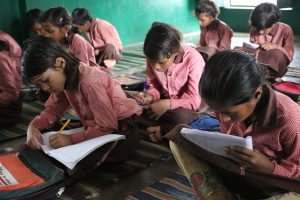 Education has been a key factor to make an individual conscious of his/her role in society. Hence it is essential to provide equal opportunities of education to all children without any discrimination. Integrity, unity, progress, and prosperity of any nation depend on this very factor. The present day education system suffers from many drawbacks. The meaning of education is to inculcate human values in human beings. Only then will he or she be beneficial for, and contribute to, society. DRI runs a number of schools (Vidyapeeth) for children of tribal and non-tribal families which are mostly residential. Teaching through the concept of Gurukul is also in vogue in DRI system of nation building process through human resource development.
Education has been a key factor to make an individual conscious of his/her role in society. Hence it is essential to provide equal opportunities of education to all children without any discrimination. Integrity, unity, progress, and prosperity of any nation depend on this very factor. The present day education system suffers from many drawbacks. The meaning of education is to inculcate human values in human beings. Only then will he or she be beneficial for, and contribute to, society. DRI runs a number of schools (Vidyapeeth) for children of tribal and non-tribal families which are mostly residential. Teaching through the concept of Gurukul is also in vogue in DRI system of nation building process through human resource development.
Social Consciousness – Dispute free Society
What make us all human is our capacity for language, empathy, internal dialogue and emotions. However, before we are capable of such characteristics, we first needed to develop consciousness that establishes our understanding of ourselves and others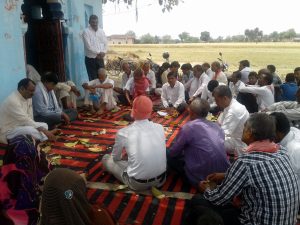 . Togetherness and brotherhood has been a basic human need. But the social consciousness among the people has changed. Society is divided into castes, creed and religion. The people have become superstitious and self-centered. A wide gap has appeared between rich and poor, higher society and lower society, upper caste and lower caste, male and female, etc. bringing disputes of all kind. The main cause of all the evils in the society is the lack of sense of social responsibility. Every individual has to recognize his/her duty to society and understand that without society he/she cannot lead a peaceful and happy life. In the current political and social scenario in the country, where division is opposed to unity is being encouraged in every strata of society, it is not surprising that the incidence of disputes are on the rise in rural areas. Most of the disputes are of a civil nature and have basically evolved from petty issues. The major drawback of these disputes is that they impede the progress of both the individuals involved, as well as the community as a whole, since warring neighbors do not want to work together for their common benefits. Also as Indian legal system is overburdened, court cases taken several years to be resolved.
. Togetherness and brotherhood has been a basic human need. But the social consciousness among the people has changed. Society is divided into castes, creed and religion. The people have become superstitious and self-centered. A wide gap has appeared between rich and poor, higher society and lower society, upper caste and lower caste, male and female, etc. bringing disputes of all kind. The main cause of all the evils in the society is the lack of sense of social responsibility. Every individual has to recognize his/her duty to society and understand that without society he/she cannot lead a peaceful and happy life. In the current political and social scenario in the country, where division is opposed to unity is being encouraged in every strata of society, it is not surprising that the incidence of disputes are on the rise in rural areas. Most of the disputes are of a civil nature and have basically evolved from petty issues. The major drawback of these disputes is that they impede the progress of both the individuals involved, as well as the community as a whole, since warring neighbors do not want to work together for their common benefits. Also as Indian legal system is overburdened, court cases taken several years to be resolved.
Deendayal Research Institute has identified the lack of social consciousness as a factor resulting in disputes in the village society through a well crafted social survey and introduced a mechanism of dispute resolution at village level through persuasion. Now this mechanism has keenly been observed and followed by other organizations at their places.
Research & Development in Physical Science
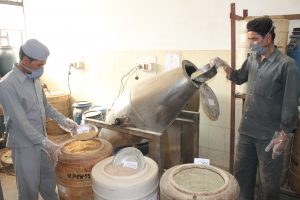 An Ayurveda Research Laboratory equipped with modern instruments is a specialty of this centre. The Rasshala manufacturers nearly three hundred Ayurvedic drugs from the herbal materials available in Chitrakoot. The Arogyadham at Chitrakoot was established in collaboration with the JRD Tata Foundation for Research in Ayurveda Science, Yoga and Naturopathy. With a campus spread over 43 acres at the banks of the river Mandakini in Chitrakoot, it has an Outpatient Department and an In-Patient Department with a provision of 100 beds.
An Ayurveda Research Laboratory equipped with modern instruments is a specialty of this centre. The Rasshala manufacturers nearly three hundred Ayurvedic drugs from the herbal materials available in Chitrakoot. The Arogyadham at Chitrakoot was established in collaboration with the JRD Tata Foundation for Research in Ayurveda Science, Yoga and Naturopathy. With a campus spread over 43 acres at the banks of the river Mandakini in Chitrakoot, it has an Outpatient Department and an In-Patient Department with a provision of 100 beds.
For more information, visit our website https://www.dri.org.in/
